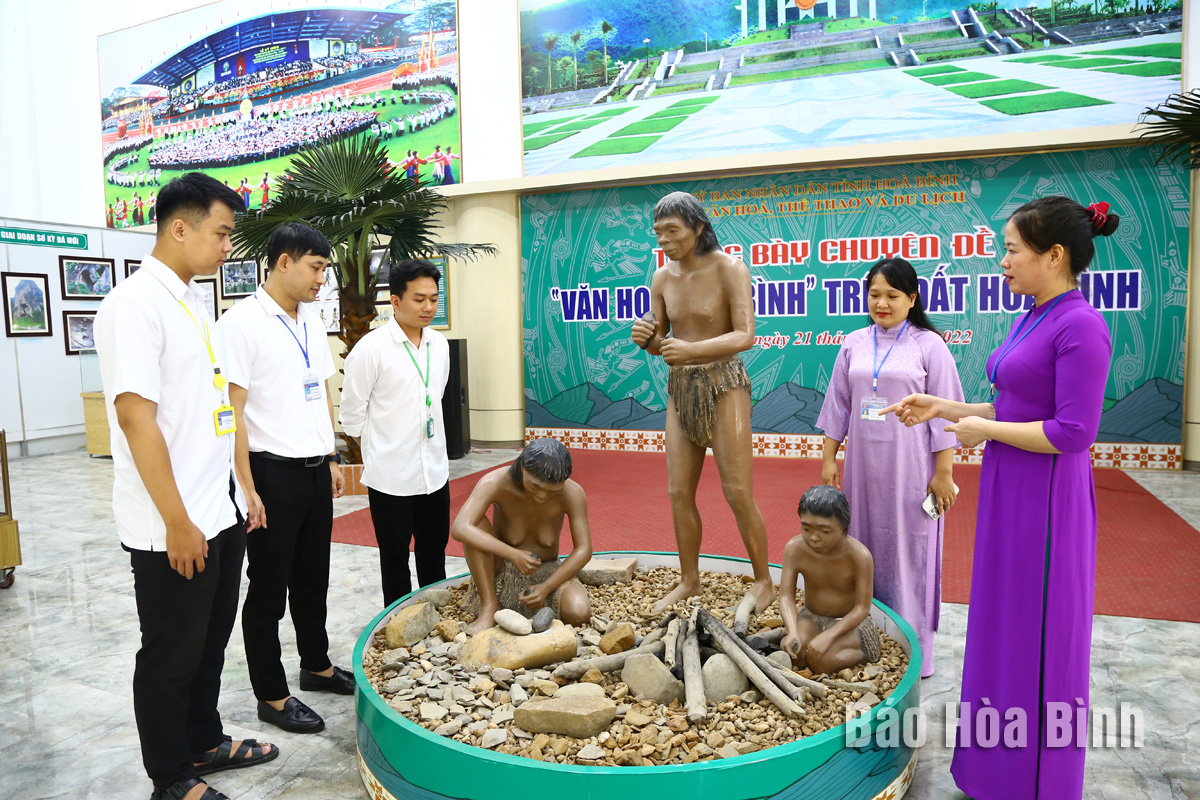
Hoa Binh province has paid due attention to preserving and promoting the cultural values of the Muong ethnic minority group and the Hoa Binh Civilisation (Hoabinhian) – a valuable heritage of the country and the mankind.
At the exhibition on the Hoa Binh Civilisation.
Various documents were issued to direct the preservation and promotion of the values of the Hoa Binh Civilisation, while the state management over archaeological sites related to the culture has attained important achievements.
According to Director of the Hoa Binh Museum To Anh Tu, the province is now home to 87 relic sites having relations to the Hoa Binh Civilisation, ten of which was recognised as national relic sites, while many have become popular tourist sites like the stone roof of Vanh village in Lac Son district, and Cho cave in Luong Son district.
The values of the local heritages have been brought closer to the public, particularly researchers and students, from far and wide as the province has organised various mobile exhibitions in Hanoi, and Thai Nguyen and Hung Yen provinces.
Particularly, two seminars held in 2017 and 2022 to mark the 85th and 90th anniversaries of the world recognition of the Hoabinhian drew the participation of many domestic and international scientists, and cultural heritage managers, affirming the significance of the standout values of the archeological site in the locality to the study of the Hoabinhian in Vietnam and the world.
However, as the preservation work has faced formidable challenges, several Hoabinhian relic sites have been destroyed, while many have not received adequate investment to serve research and tourism purposes.
Dr. Nguyen Van Viet, Director of the Centre for Southeast Asian Prehistory, suggested the province pay due attention to training human resources to build a museum on the Hoa Binh Civilisation, and rank all of the uncovered relic sites.
Under a project to preserve and promote the values of the Muong ethnic culture, and the Hoabinhian for the 2023-2030 period, Hoa Binh is focusing on building planning schemes for outstanding Hoabinhian relic sites, including the renovation of the national special relic site of Trai hamlet cave and stone roof of Vanh village, and promoting scientific research for, and restoration of Hoabinhian relic sites with the support of domestic and international specialists.
With an increasingly vibrant and widespread emulation movement aimed at building cultured residential areas and cultured families, Yen Thuy District has been making steady progress toward improving both the material and spiritual well-being of its people, while fostering a civilized, prosperous, beautiful, and progressive community.
Once lacking recreational spaces and community facilities, Residential Group 2 in Quynh Lam Ward (Hoa Binh City) has recently received attention for the construction of a new, spacious, and fully equipped cultural house. The project followed the model of state support combined with public contributions in both labor and funding.
The "All people unite to build cultural life" movement, which has been effectively integrated with Kim Boi district’s socio-economic development goals, is fostering a lively spirit of emulation across local residential areas, hamlets, villages, public agencies, and enterprises. In addition, through the initiative, traditional cultural values are being preserved and promoted, while community solidarity and mutual support in poverty reduction and economic development are being strengthened.
A working delegation of the Hoa Binh provincial People’s Committee led by its Permanent Vice Chairman Nguyen Van Toan on June 11 inspected the progress of a project to build the Mo Muong Cultural Heritage Conservation Space linked to tourism services in Hop Phong commune, Cao Phong district.
Born and growing in the heroic land of Muong Dong, Dinh Thi Kieu Dung, a resident in Bo town of Kim Boi district, in her childhood was nurtured by the sweet lullabies of her grandmother and mother. These melodies deeply imprinted on her soul, becoming an inseparable part of her love for her ethnic group's culture. For over 20 years, this love for her hometown has driven Dung to research, collect, and pass down the cultural values of the Muong people to future generations.
In the final days of May, the Ethnic Art Troupe of Hoa Binh Province organized performances to serve the people in remote, mountainous, and particularly disadvantaged areas within the province. These were not just ordinary artistic shows, but they were the meaningful journeys aimed at spreading cultural values, enhancing the spiritual life of the people and contributing to the preservation of ethnic minority cultural identities.



